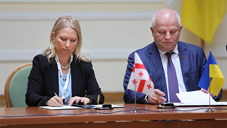Natia Turnava takes part in DCFTA informal ministerial meeting
By Natalia Kochiashvili
Thursday, May 23


The abovementioned format was initiated by Cecilia Malmstrom, a member of the European Trade Commission. The parties had an opportunity to discuss how the DCFTA agreements are carried out in all three countries.
The representatives of Georgia, Ukraine and Moldova highlighted the progress and challenges of implementing DCFTA.
They mentioned that the trade between DCFTA countries and the EU has been constantly growing in the past four years. Discussions also referred to customs regulations, sanitary measures and the public procurement - areas that were covered during the previous meeting. Each DCFTA country also works to ensure the protection of intellectual property rights and the elimination of trade barriers.
In the plenary session, it was noted that the EU will continue to support the implementation of DCFTA in all three countries with various meaningful reforms. Parties also underlined the importance of development of governance and the rule of law, which, in turn, will stimulate investment and trade growth.
Aside from discussing the details of the implementation of DCFTA, the attendees discussed success stories of Georgian, Ukrainian and Moldovan companies that operate with EU. During a round table with businessmen, these companies presented their stories and discussed possibilities and challenges within the agreement.
The number of exporters to EU countries has increased significantly for all DCFTA countries since 2015. In Georgia, the raise was 35%, in Moldova - 40% and in Ukraine - 26%. It was noted that the growth of export-oriented companies are a proof that deepening trade ties between the Eastern Partnership region, as well as within the region and the EU, are the prerequisites for economic growth and creation of new workplaces. For this purpose, the ministers underlined the importance of implementing the reforms and obligations assumed under the Agreement.
The Minister of Economy and Sustainable Development of Georgia, Natia Turvanava, and the First Deputy Prime Minister of Ukraine, Economic Development and Trade Minister, Stepan Kubiv, signed the Protocol that will enable the Parties to implement "Regulations on the origin of the Regional Pan-Euro-Mediterranean Convention".
According to Turnava, the document which was signed, will allow the country to simplify export to the EU. “The new priorities on the agenda led us to the scheme that entered into force today, which will enable us to process products together. Products, the processing of which will begin in Ukraine and end in Georgia, will be more easily delivered to the European markets, and vice versa, products, the processing of which will start in Georgia and end in Ukraine, will be better represented in the European Union” said the Economy Minister.
At the same time, Ukraine and Moldova and Georgia and Moldova once again reiterated their willingness to continue cooperation regarding the Pan-Euro-Mediterranean Regulations.
During the visit, Turnava met with the Minister of Economy and Infrastructure of the Republic of Moldova, Kirill Gaburich, and discussed bilateral trade-economic relations with the EU and the DCFTA countries. Another issue that ministers talked about was cooperation in tourism sector.
The sides agreed that the 3rd informal ministerial will be held in Tbilisi in 2020. Turnava invited the participants to the 1st Eastern Partnership Investment Forum that is to be held on July 11 in Batumi, Georgia. International conference “Georgia’s European Way” will be taking place in parallel with the forum.
Deep and Comprehensive Free Trade Area (DCFTA) is included in the EU-Georgia Association Agreement, which entered into force in July 2016 and strives for political association and economic integration.
